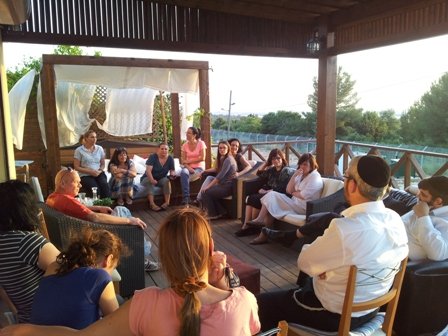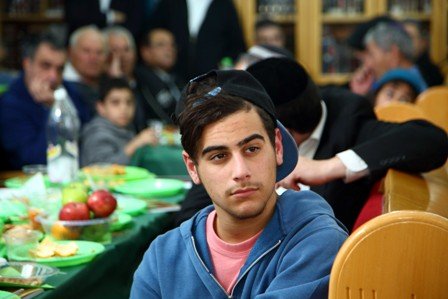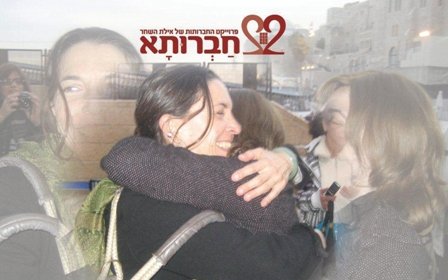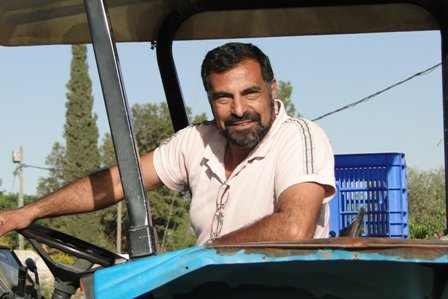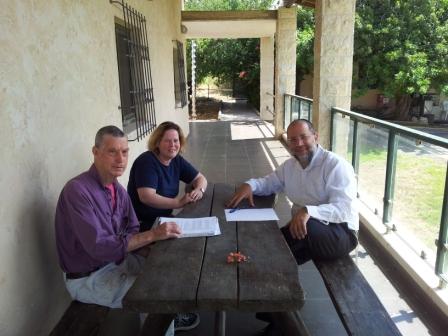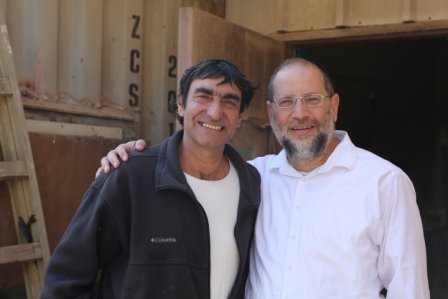Synagogue furniture was installed this week at the newly established synagogues at Moshav Moledet and Moshav Ro'i.
Moshav Ro'i
When Rabbi Shlomo Raanan, Director of Ayelet HaShachar, received a phone call from the Moshav Ro'i in the Jordan Valley, he was swift to move into action. The community leaders' request was this: Could he help them establish a regular Shabbat minyan [prayer service with a quorum]? An alarm was set off in his mind: Do they actually have no prayers on Shabbat? Do they truly have no Shabbat in Ro'i?
His Jewish heart ached. Something had to be done to help them infuse the community with a spark of yiddishkeit.
Moshav Ro'i nestles on the northern end of the Jordan Valley, with the stoney white Judean desert forming its backdrop. Setting out from Jerusalem, Rabbi Raanan, accompanied by this writer, began his journey from the golden city towards the Dead Sea. Descending swiftly, we noted the sea-level signs, informing us that we were descending deeper and deeper. As we went lower, we finally reached the lowest place in the world, home to natural fauna and flora not found anywhere else on the planet.
At the Jericho junction, we took a left, traveling north towards Beit She'an. This region boasts vast sweeping lengths of banana and date tree plantations. Showing off their prowess, these trees bear fruit not only for the locals and for export, but also provide the population with lulavim (palm branches) just in time for the Sukkot festival.
Approaching the Adam Junction, we turned left onto Route 57 down a deserted 15-kilometer trek. Arab villages swathe the area; the threat of the unknown was in the air.
Moshav Ro'il shines in the sunlight even from afar, a jewel in the desert, with tent-like arches that protect its growing produce, reminiscent of the white cloth sails on a windy ship. The green beauty of Ro'i rivals the empty spaces it calls home. It is an oasis filled with promise, mushrooming out of the land like a desert island in the ocean.
A population of 300 residents, 45 families, lives in Ro'i, named to commemorate fallen IDF Paratroopers Commander Uzi Ya'iri. Uzi gave his life attempting to rescue the trapped occupants of the Savoy Hotel in Tel Aviv in a showdown with Palestinian terrorists in 1975. The terrorists had overtaken the building, threatening the lives of those inside, and the Israeli Defense Forces, made a brave evacuation attempt.
Founded in 1976, the moshav was established by Jews whose vision was to make the desert bloom - and bloom it does.
Workers on tractors with ruddy, sun-baked skin greet us, quick to offer to show Rabbi Raanan around. With justified pride they show him their achievements, comprising a thriving, beautiful cooperative settlement.
But for all these achievements - homes and flowering gardens, kindergartens and schools, a community center building - the Moshav has existed for almost 35 years without a synagogue. The members had now decided that this should change.
Rabbi Raanan encouraged them and promised them help. He was later overjoyed to receive another call from them, this time informing him that, with his encouragement, they had applied to receive a building for a synagogue from the Religious Affairs Ministry - and that the request had been approved!
Their needs were now different. They require furnishings, a Holy Ark (aron kodesh), a Bima [stand], benches and a basic library, plus a mechitzah [partition] for the women's gallery. Ayelet HaShachar has helped many other communities obtain these items, and Ro'i is to be no exception.
Where flowers and grass grew, a shul has sprouted.

